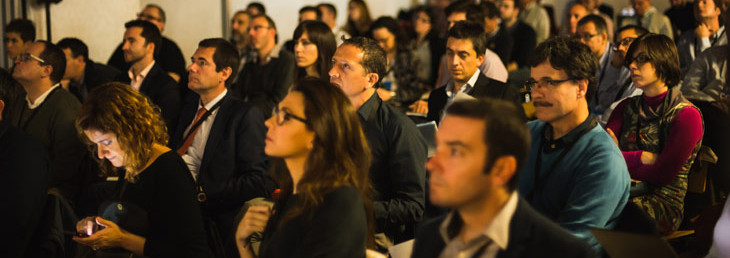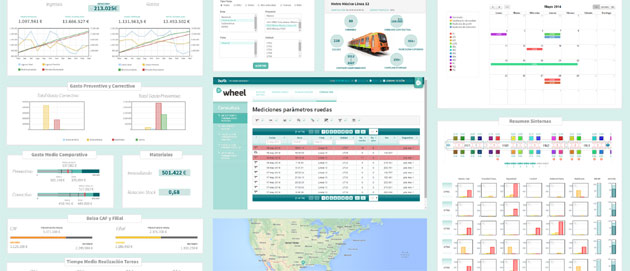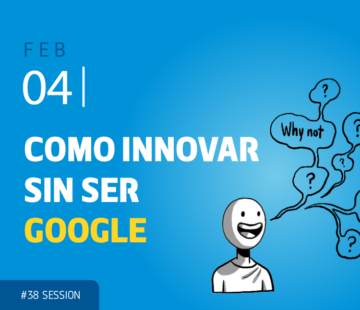Co-Session #19 Big Data (II): The creativity factor

Holding this Co-Session in Barcelona’s Design Hub gave us two advantages, which it would have been silly not to exploit. Firstly, the location in the new building of Materfad, Centro de Materiales de Barcelona, dedicated to technological research and investigation in the field of new materials. Secondly, the concurrence in time and place with the annual meeting of the Art Directors Club of Europe (ADC*E). Both formed part of the day’s programme.
From Javier Peña, director of Materfad, we learned that new products increasingly require a greater variety of materials, and how the rare earth elements are now having an influence on global economy, and increasing their value in relation to the risk in supplying them. He also told us that nanotechnology has already reached the market, that there are still high hopes for graphene, and that in the meantime sensorial and intelligent materials which are able to react to their environmental conditions will feature strongly in the near future.

Your brand won’t survive if it’s not influential
In a collaborative exchange, Alfons Cornella, founder of Co-Society, addressed the creative directors gathered in Barcelona to talk to them about co-creation. And in return, Amir Kassai, president of ADCE and Chief Creative Officer of DDB Worldwide, introduced the guests of this Co-Session on big data to different cases of how brands are creatively using data and making it relevant to their customers. According to Amir, we are already at the beginning of a third age of digitalisation, in which everything will be connected to everything else. “If you’re not an influence, you’ll be a nobody” prophesised Amir. It’s no longer just about selling, but being able to create value. In this context, brands must be influential to survive. And in order to be influential and relevant, technology may be important, but it will be of little use if it doesn’t take into account the creativity and humanity that nothing can provide better than our own minds and souls.
Advanced analysis to anticipate customers’ behavioural changes
The conversion of data to action is also being explored by a growing number of startups whose value proposals consist of the exploitation of big data in new and innovative ways. In the retail sector, for example, Kernel Analytics offers advanced analysis tools to improve systems for the prediction of supply chains from 20% to 40%, and thus significantly reduce returns and out-of-date stock. Tecnio Centre Easy presented several other cases of using big data in operational decisions, such as the possibly of anticipating a change in client-base behaviour using historic data from CRM, or the detection of people who can help to make a specific decision that is being delayed by lack of knowledge within the organisation.
Machines talk to us. Listen to them.
Today the majority of companies make decisions based purely on data accumulated from the company history. For Gorka Parada from NEM Solutions this is like trying to drive using only the rear-view mirror. NEM Solutions proposes using historical data to reduce the uncertainties of the future. If an engine or an aerogenerator is stopped it can be critical for company productivity, but now it is possible to listen to this and other types of activity using sensors and intelligent systems that are capable of collecting data on tension, temperature, speed, and oil levels, and in this way a model of the norm can be calculated for each activity – a personal DNA, a fingerprint that when cross referenced with personal data can detect deviations in real time. This is how machines are talking to us, and we should be taking their messages to the table where decisions are made.

Big data is for kids too
In its aim to bring science, technology and innovation to a younger audience, La Mandarina de Newton includes a specific family and school workshop dedicated to the technology of capturing data and using it to a range of ends. The workshop aims for greater knowledge of new technologies, which is mistakenly taken for granted among those considered the generation of digital natives, and encourages a critical vision of their use which many children and adults still lack. Data & Us teaches us to distinguish between quantitative and qualitative data and to recognise that information and knowledge are not the same thing. With Data & City we analyse the concept of geolocalisation and go out into the world to collect data in order to put it in a map and use it to draw conclusions. Data & the World offers the opportunity to work from locations visited around the world with the visualisation of data.
Neuromarketing & Neurostrategy: Using neuroscience to ask data the right questions
Jorge Fernández is CEO of Kernel BC, a consultancy firm that uses processes of business creativity strategies based on an analysis and prioritisation founded in neuroscience. His idea is that the best way to exploit the potential of big data starts with asking the right questions. Companies are managed taking into account only the 3% of customer decisions that are made consciously. Neuro-marketing, however, can obtain a competitive edge from concentrating its efforts on the other 97% of customers’ – unconscious – decisions. The field of the unconscious focusses on the anchors, references and facilitators which according to neuro-marketing are what most affect the decisions of consumers. The subconscious understands a determined product or service through very simple and primitive concepts and behaviours, and is influenced more by stories than logical argument.
These facts demonstrate a need for creative strategies that prioritise storytelling, which no big data evidence may ever be able to replace.
